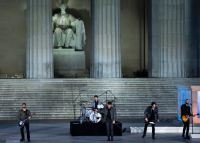By John Christen

President Donald J. Trump’s pre-inauguration concert, the “Make America Great Again! Welcome Celebration,” blessed the ears of hardworking Americans on Thursday, Jan. 19. The aural pleasure-fest beautifully melded the “A-list” musical voices that best represent the law-abiding, (Christian) God-fearing citizens that make up this great nation. The event moved swaths of audience-members to tears, all of whom could only produce one thought: God bless our president-elect.
My apologies! I was writing about the event using “alternative facts” as a reference. Let me adjust my account of the concert while simultaneously referencing the truth.
Factually speaking, Trump’s inauguration planning team faced more rejection from popular music artists than any other president. Several high-profile artists, such as Elton John, Céline Dion, Garth Brooks, KISS, Moby, David Foster, Rebecca Ferguson and Charlotte Church turned down the offer. Even the Bruce Springsteen cover-band, The B-Street Band, backed out weeks before the event.
Traditionally, performing at the president-elect’s inaugural proceedings is considered an incredible honor, despite each artist’s individual political beliefs. Perhaps, for this reason, past president-elects have experienced negligible difficulty in securing performers for pre-inaugural festivities.
Trump responded to criticism of his booking difficulties by instructing his team to issue a brief, cordial statement that asked Americans to focus on the issues that matter, like restructuring the Affordable Care Act and examining U.S. relations with Russia.
Kidding. Actually, on Dec. 22, he sent an innocuous and false tweet to his followers to end the debate over whether or not he is, in fact, thin-skinned: “The so-called ‘A’ list celebrities are all wanting tixs to the inauguration, but look what they did for Hillary, NOTHING. I want the PEOPLE!”
I buy that. Trump wants to avoid “A-list” celebrities, since most of them oppose him. Plus, that attitude plays into his rhetoric about representing the unheard, i.e. the people. Unfortunately, his team requested that several “A-list” celebrities perform at the pre-inauguration bash. His tweet carries relatively little meaning, other than telegraphing his post-rejection discontent to the country.
Perhaps Trump was unable to successfully secure performances by high-profile artists because popular, non-ignorant U.S. culture has almost unilaterally decided that he poses a serious threat to national security, economic prosperity, the healthcare of more than 18 million Americans, first-amendment religious and free-speech rights, minority and LGBTQ civil liberties and the hard-fought rebranding of what it means to be a woman in this country. Does anybody remember that President Trump was accused by almost 20 women of sexual assault during his presidential campaign? Bobby Bush sure does.
Or, maybe the honor of performing for the soon-to-be leader of the free world pales in comparison to the honor of fighting against re-normalizing the mistreatment of women, religious and racial minorities, immigrants and those in the LGBTQ community.
For the record, those who performed at the “Make America Great Again! Welcome Concert” included: Jackie Evancho, The Mormon Tabernacle Choir, The Rockettes, 3 Doors Down, Toby Keith, Sam Moore, Lee Greenwood, Chrisette Michele, The Piano Guys, DJ Ravidrums, The Frontmen of Country, Travis Greene, Tony Orlando and Tim Rushlow. These artists, plus many high school and college marching bands made up the program at Trump’s pre-inauguration bonanza.
So yes, Trump’s “Make America Great Again! Welcome Concert” lineup might not attract the same attention as Firefly, Governor’s Ball or Coachella, but does it matter?
Well, yes and no.
When reflected upon out of context, a reasonable person might explain how people have the freedom to express personal music preferences, so it carries little importance. Furthermore, pre-inaugural music acts are not germane to the effectiveness of a future president.
What is significant, however, is the overall level of disdain the music community feels toward Donald Trump. These — not all — artists’ disdain indicates a tangible ideological split between one United States and another. Politics and ideologies aside, these “A-list” celebrities’ refusals to perform at Trump’s inauguration illustrates a real division between popular and suppressed traditional cultures. Their refusal becomes a reinforcement of one of Trump’s key themes, paraphrased here: popular culture ignores Americans that live in rural “flyover” areas and espouses coastal, urban lifestyles, so who needs them when you have nostalgia and Trump?
The most popular music tends to be music that attempts to break boundaries, challenge norms, express emotions and tell stories in a new way. It empathetically captures the imagination and unites us in one resounding effort to express humanity. Is it really any surprise that President Trump was unable to secure the best that the American music community has to offer?
John Christen, FCRH ’19, is an international political economy major from Philadelphia, Pennsylvania.









































































































































































































Marty Catahula • Jan 28, 2017 at 6:56 pm
John- well done! Good job of explaining why the a-list is the a-list and why the a-listers and trump are at cross-purposes. However there are those who listen and buy a-list music and yet voted for trump. They just aren’t listing closely are they.